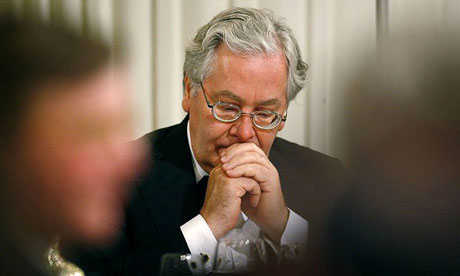
Mervyn Allister King(born March 30, 1948), Governor of the Bank of England.succeeded Sir Edward George on June 30, 2003 Studied at Wolverhampton Grammar School, King's College, Cambridge (gaining a first class degree in economics in 1969) and St John's College, Cambridge. He also studied at Harvard as a "Kennedy Scholar".
He then taught at the University of Cambridge and the University of Birmingham. He has also been Visiting Professor at Harvard and the Massachusetts Institute of Technology where he shared an office with then "Assistant Professor Ben Bernanke". From October 1984 he was Professor of Economics at the London School of Economics.
King joined the Bank of England in March 1991 as Chief Economist and Executive Director, having been a non-executive director from 1990 to 1991. He was appointed Deputy Governor in 1997, taking up his post on 1 June 1998. In the same year King became a member of the influential Washington-based financial advisory body, "the Group of Thirty."
Mervyn King an ex-officio member of the Bank's interest-rate setting Monetary Policy Committee since its inception in 1997, he is the only person to have taken part in every one of its monthly meetings to date. His voting style is often seen as "hawkish". Before becoming Governor, he regularly voted for tighter monetary policy than his colleagues. That pattern has continued in a more muted way as Governor: most notably, he was outvoted opposing the MPC's August 2005 interest rate cut, and in June 2007 was in the minority by voting for higher rates. King's willingness on occasion to take a minority position is unusual among central bank leaders.
Highlighted links and points of interest:
1: Kennedy Scholarships provide full funding for ten to twelve British post-graduate students to study at either Harvard or the Massachusetts Institute of Technology. , the scholarship program is described as a way to "offer exceptional students unique opportunities to broaden their intellectual and personal horizons, in ways that are more important than ever in an era defined by global interaction.”
2: Ben Bernanke is an American economist, and the current Chairman of the Board of Governors of the United States Federal Reserve and fellow MIT.
3: The Massachusetts Institute of Technology(MIT) is a private research university located in Cambridge, Massachusetts. MIT has five schools and one college, containing a total of 32 academic departments, with a strong emphasis on scientific and technological research.
MIT researchers were involved in efforts to develop computers, radar, and inertial guidance in connection with defense research during World War II and the Cold War. In the past 60 years, MIT's educational programs have expanded beyond the physical sciences and engineering into social sciences like economics, philosophy, linguistics, political science, and management.
4: The Group of Thirty was founded in 1978 by Geoffrey Bell at the initiative of the "Rockefeller Foundation", which also provided initial funding for the body. Its first chairman was Johannes Witteveen, the former managing director of the "International Monetary Fund".
5: The International Monetary Fund (IMF) is an international organization that oversees the global financial system by following the macroeconomic policies of its member countries, in particular those with an impact on exchange rates and the balance of payments. It is an organization formed to stabilize international exchange rates and facilitate development. It also offers highly leveraged loans mainly to poorer countries. Its headquarters are located in Washington, D.C., USA.
6: The Rockefeller Foundation is a prominent philanthropic organization and private foundation based at 420 Fifth Avenue, New York City. The preeminent institution established by the six-generation Rockefeller family, it was founded by John D. Rockefeller ("Senior"), along with his son John D. Rockefeller, Jr. ("Junior"), and Senior's principal business and philanthropic advisor, Frederick T. Gates, in New York State in 1913.
Its central historical mission is "to promote the well-being of mankind throughout the world."
Some of its historical achievements include:
1.Financially supported education in the United States "without distinction of race, sex or creed";
1.Established the first schools of public health;
2.Developed the vaccine to prevent yellow fever;
3.Funded the original development of the social sciences;
3.Supported the establishment of a large range of American and international cultural institutions;
4.Funded agricultural development to expand food supplies around the world.
Article of interest:
http://www.guardian.co.uk/business/mervyn-king
Fluff......
As we can see a monetary pattern is unfolding, Mervyn King has been educated and is within the presence of the intermingled global powers ...
note: point of significant interest is The Rockefeller Foundations not only do the have monetary connections but also in Financially supporting the education system in the United States and also establishing schools of public health, vaccine, social sciences mission statement! "to promote the well-being of mankind throughout the world......













0 Response to "Mervyn King (economist) BOE"
Post a Comment